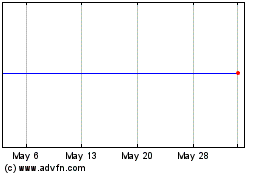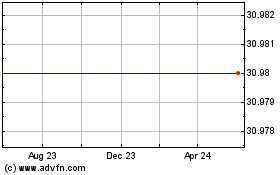UPDATE: Lilly 4Q Net Drops 27% As Zyprexa Sales Drop 44%
January 31 2012 - 8:43AM
Dow Jones News
Eli Lilly & Co. (LLY) reported a 27% decline in
fourth-quarter profit, as sales of antipsychotic Zyprexa took a big
hit from new generic competition.
The Indianapolis drug maker also disclosed Tuesday that two
late-stage clinical trials of experimental Alzheimer's disease drug
solanezumab will continue, following interim safety and futility
analyses by an independent monitoring committee. The trials are
expected to be completed in the second half of the year.
Lilly is bracing for a rough couple of years due to the decline
in Zyprexa sales and the expected loss of exclusivity for some
other drugs. The company is betting that continued sales growth for
certain drugs, and the introduction of new ones, will help replace
revenue lost to generic competition.
"We're seeing very good growth trajectories for many of our
products," Chief Executive John Lechleiter said in an
interview.
Solanezumab would be a big contributor to a Lilly rebound if it
shows a positive risk-benefit profile in testing and clears
regulatory review. But investor expectations for the drug are
relatively low due to uncertainty that the drug's mechanism of
action is the right approach to treating Alzheimer's, a form of
dementia that gets worse over time.
Lechleiter cautioned that the hurdle for continuing the
solanezumab trials was relatively low, and that investors shouldn't
"over-interpret" the decision to continue them. The studies will
have to be completed to determine whether the drug is safe and
effective, he said.
For the fourth quarter, Lilly reported profit of $858.2 million,
or 77 cents a share, down from $1.17 billion, or $1.05 a share, a
year earlier. The latest quarter included a charge related to its
recent withdrawal of sepsis drug Xigris from the market and other
costs; excluding these, earnings would have been 87 cents a share,
above the mean estimate of analysts surveyed by Thomson Reuters of
81 cents a share.
Fourth-quarter revenue dropped 2% to $6.05 billion, above the
Thomson estimate, with favorable currency-exchange rates providing
a 1% boost to sales.
Global sales of Zyprexa, which treats schizophrenia and other
conditions and was previously Lilly's top-selling product, tumbled
44% to $750 million. The drug's U.S. patent protection expired in
October. U.S. Zyprexa sales dropped 56%.
Several other Lilly drugs helped cushion the Zyprexa decline.
Sales of antidepressant Cymbalta jumped 20% to $1.2 billion.
Diabetes drugs Humalog and Humulin also posted sales gains, as
did cancer treatment Alimta.
Sales of erectile dysfunction pill Cialis rose 6%.
Lilly's animal-health unit, which has grown partly through
acquisitions, posted a 10% sales gain, to $468 million.
Lilly reiterated the 2012 financial forecast it provided earlier
this month, which reflected a steeper-than-expected decline in
full-year Zyprexa sales.
Lilly said it might have to make material changes to its 2011
reported results as well as its 2012 financial forecast, because it
may have to change how it accounts for the recent termination of
its diabetes-drug partnership with Amylin Pharmaceuticals Inc.
(AMLN). Lilly is consulting with the Securities and Exchange
Commission on the Amylin accounting treatment.
Shares were up 3.18% at $40.50 in premarket trading. The stock
has risen 5.6% over the past three months.
-By Peter Loftus, Dow Jones Newswires; +1-215-982-5581;
peter.loftus@dowjones.com
--Melodie Warner contributed to this article.
Amylin Pharmaceuticals, Inc. (MM) (NASDAQ:AMLN)
Historical Stock Chart
From May 2024 to Jun 2024

Amylin Pharmaceuticals, Inc. (MM) (NASDAQ:AMLN)
Historical Stock Chart
From Jun 2023 to Jun 2024
